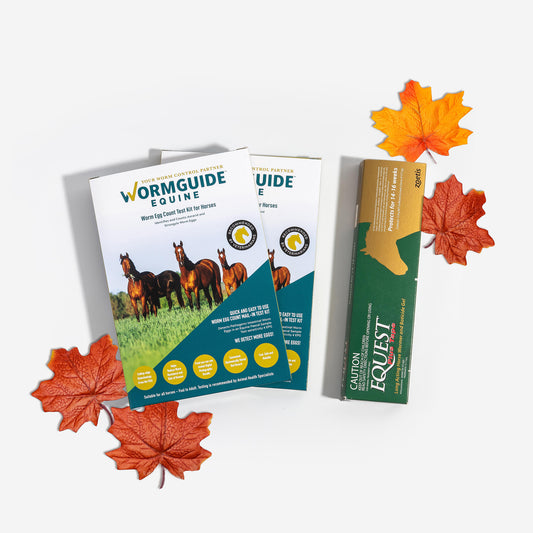Moving to the recommended sustainable worm control is exciting, and if foals, weanlings, yearlings, two-year olds and mature horses could talk, we bet they are very keen to be medicated with worming drugs LESS and only when necessary, and without hoping or assuming the worming treatment works.
Congratulations!!
You`re recognised that the old-fashioned traditional habits of frequent blind de-worming has failed.The slow catastrophe of resistance has unfolded, and the golden era of de-worming drugs for horses is coming to an end.
A sad tale but true!
Horse worm control has changed dramatically. During the past decade, a sustainable alternative has been researched by equine scientists and parasitologists, and with a bucketload of scientific evidence that it can slow down the development of resistant worms, it`s the only way forward to protect our horses.
Here`s more evidence from the world`s leading parasitologist Dr Martin Nielsen that shows traditional frequent worming is unnecessary and only drives worms to become resistant. The study shows that reducing the number of treatments, does not have any adverse health risks to horses. Here are two videos one for horse owners and managers, and one for vets.
For horse owners and managers
What happens if you worm less? OMG will something bad happen?
For veterinarians
More information about the study at four stud farms in New Zealand here
But before you make the switch to best practice sustainable worm control, it`s super important to know the ultimate goals and what you need to focus on and achieve and how to transition.
- Use worming products that are still effective to treat specific types of horse worms. Avoid worming failures.
- Avoid parasitic worm disease, not try to eradicate intestinal worms.
- Minimize disease risk while slowing the development rate of worms becoming resistant to de-wormers.
The ultimate goal is to keep the worming product you use effective for as long as possible for horses that really need treatment. That`s why it`s called sustainable worm control.There are no new products in the foreseeable future, if ever. And keep in mind once your horses and your pastures have resistant worms to a worming drug... it never goes away!
Prepare for transition success with the help of Dr Martin Nielsen and WormGuide’s faecal egg counts.
Here Dr Nielsen shows us how we are supposed to use faecal egg counts (FECs), and what they are telling us. This 12 minute video spells it out!
1.The recommendation is to check for resistant worms once a year.
Check the worming treatment you use for your horse or horse herd kills the worms.There`s no other way of knowing resistant worms are present without the faecal egg count reduction test (FECRT).
It`s easy and with WormGuide`s high performing egg counts, you`ve got a result that is far more precise and reliable than any other technique on the market. You need the scientifically validated technique with better sensitivity that reliably detects even low egg numbers, these eggs should not be missed.
How to do FECRT? Dead worms don`t lay eggs... are we right?
Find out if the wormer you use kills the intestinal worms for your horse. Best practice recommends once a year.
Meet our Faecal Egg Count Reduction test (FECRT)

How to do a FECRT for herd health once a year? Check the worms that live on your pasture and inside your horses are not resistant to the worming product you use. You don`t need to test all the horses in your herd.
Meet our Faecal Egg Count Reduction Test (FECRT) for herd health

Experts agree that in this day and age it is irresponsible to deworm away willy-nilly without checking for resistance. It is the starting point for sustainable worm control success.
2. Prepare for transition success for your mature horses (over 3 years) with WormGuide FECs
Profile your horse or each horse in your herd so you know which ones are the higher egg shedders.
Best practice recommends that all horses get a foundation worming treatment twice a year, but we use egg counts to guide us to the horses in need of additional treatments.These horses always have high egg counts, no matter what you do.
It doesn`t mean more worms inside high egg count horses, it means more eggs on pasture that re-infect themselves and infect other horses with worms.
Classify each horse`s strongyle worm egg shedding level into low, moderate and high to a construct sustainable worm control plan for each horse.
Horses seem to maintain their egg shedding level most of their lives but sometimes it can shift due to forms of stress. Best practice recommends monitoring egg shedding levels every year.

3. Prepare for transition success for your young horses with WormGuide FECs
You can`t know by looking at a foal, what`s going inside that foal...testing is the only way!
Faecal egg counts give you useful information about the presence of ascarids (roundworm), small strongyle worms or both. Weanlings and yearlings can have these worms at the same time.
Since there is no safe all-round worming drug anymore that can effectively treat both, you need to choose the most appropriate worming product for each type of worm present in your horse baby.
Congratulations! You’ve made a successful transition to sustainable worm control — the start of your horses` meaningful and up to date worm control journey for health and happiness.
Top Transition Tip
When choosing what egg count methods are best to treat your horse better, there are a number of factors that should guide your decision. The performance is one of them.
When we humans need healthcare, we`re glad more accurate and precise new technology is available to help doctors and other medical professionals reduce medical errors for better treatment and improve our lives.
Here at WormGuide we use new technology that is scientifically validated, significantly less variability, more accuracy and better precision than the outdated, commonly used, error-prone and generally accepted poor performing manual egg counting microscope methods.
The choice is yours!
Top Test Tips
1. Worming product efficacy screening
High precision technique is preferred. Increased reliability increases with more eggs being counted. Diagnostic sensitivity to reliably detect low faecal egg counts is important.
2. Monitoring of strongyle egg shedding levels
A relatively precise and accurate technique is preferred.
3. Monitoring for ascarids (roundworm) in foals, weanlings, and yearlings
Better diagnostic sensitivity is of importance and preferred.
Source: Nielsen M.K 2021, Parasite faecal egg counts in equine veterinary education, Equine Veterinary Education ,vol 34, issue 11. Further reading here
We`re proud to offer our WormGuide community, the most sophisticated egg count technology available. Up-to-date best practice has increased the demand for far better, more reliable,highest precision and accurate faecal egg counts (FECs).
Build better worm control together
If you found this post useful, please consider sharing it with others! Slowing down resistance is a collective effort for the health and happiness of all Aussie horses. Thank you!
Have a question? Our WormGuide Care team is here to help. Send us an email for transitional support.










